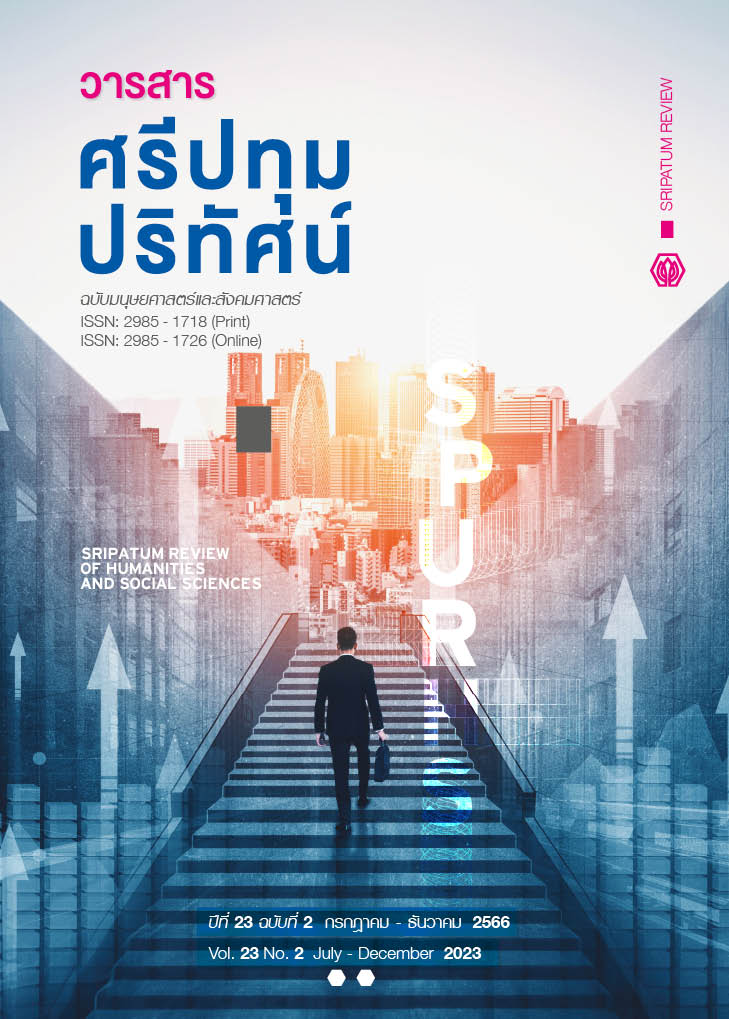Attitudes on Trustworthiness in E-commerce and Technology Acceptance of Cryptocurrency Users in Thailand
Main Article Content
Abstract
This research aimed (1) to test the influence of causal factors on trustworthiness in e-commerce, and technology acceptance and (2) to test the influence of trustworthiness in e-commerce on the technology acceptance of cryptocurrency users in Thailand. The research methodology is quantitative. The samples were 385 cryptocurrency users. The researcher used questionnaires as the research instrument. The statistics used to test the hypothesis were relationship analysis using structural equation modeling techniques. The research results found that the causal factors of consumer attitude, cognitive and behavioral components positively influenced trustworthiness in e-commerce and technology acceptance. At the same time, trustworthiness in e-commerce positively influences technology acceptance. However, the cognitive component does not influence trustworthiness in e-commerce, but is a factor that negatively influences technology acceptance. Moreover, entrepreneurs should develop a marketing strategy for publicizing news related to the use of cryptocurrencies for business, whether it can be used to pay for goods or can conduct financial transactions online in real with the business. In addition, government agencies should encourage and certify the legal use of cryptocurrencies for debt settlement to encourage investment within the country.
Article Details

This work is licensed under a Creative Commons Attribution-NonCommercial-NoDerivatives 4.0 International License.
1. กองบรรณาธิการสงวนสิทธิ์ในการพิจารณาและตัดสินการตีพิมพ์บทความในวารสาร
2. บทความทุกเรื่องจะได้รับการตรวจสอบทางวิชาการโดยผู้ทรงคุณวุฒิ แต่ข้อความและเนื้อหาในบทความที่ตีพิมพ์เป็นความรับผิดชอบของผู้เขียนแต่เพียงผู้เดียว มิใช่ความคิดเห็นและความรับผิดชอบของมหาวิทยาลัยศรีปทุม
3. การคัดลอกอ้างอิงต้องดำเนินการตามการปฏิบัติในหมู่นักวิชาการโดยทั่วไป และสอดคล้องกับกฎหมายที่เกี่ยวข้อง
References
Ajzen, I., & Fishbein, M. (1977). Attitude-Behavior Relations: A Theoretical Analysis and Review of Empirical Research. Psychological bulletin, 84(5), 888-918.
Bank of Thailand. (2019). How Close is Cryptocurrency? [Online]. Retrieved June 20, 2022, from https://www.bot.or.th/Thai/ResearchAndPublications/articles/Pages/Article_01Feb2019. (in Thai)
Cochran, W. G. (1977). Sampling Techniques. (3rd ed.). Wiley. New York: Harper & Row.
Davis, F. D. (1989). Perceived Usefulness, Perceived Ease of Use, and User Acceptance of Information Technology. MIS Quarterly, 13(3), 319-340.
Digital Economy Promotion Agency. (2021). Getting Know Cryptocurrency. [Online]. Retrieved June 2, 2022, from https://www.depa.or.th/th/article-view/article-getting-know-cryptocurrency. (in Thai)
Givan, B., Wirawan, R., Andriawan, D., Aisyah, N., Asep, A., & Putra, A. S. (2021). Effect of Ease and Trustworthiness to Use E-Commerce for Purchasing Goods Online. International Journal of Educational Research and Social Sciences, 2(2), 277-282.
Goundar, S., Lal, K., Chand, A., & Vyas, P. (2021). Consumer Perception of Electronic Commerce Incorporating Trust and Risk with the Technology Acceptance Model. In Tech Open.
Hair, J. F., Ringle, C. M., & Sarstedt, M. (2011). PLS-SEM: Indeed a Silver Bullet. Journal of Marketing theory and Practice, 19(2), 139-152.
Hermanus, J., & Indradewa, R. (2022). Perceived Value and Attitude with Trust as Mediating Variable toward Intention to Booking Hotel Online. American International Journal of Business Management, 5(3), 76-83.
Johnson, D., & Grayson, K. (2005). Cognitive and Affective Trust in Service Relationships. Journal of Business research, 58(4), 500-507.
Kanoklertwonges, p. (2021). Digital Money and Financial Freedom to the Thai Economy. Humanities and Social Science Research Promotion Network Journal, 4(3), 79-91. (in Thai)
Kline, R. B. (2011). Principles and Practice of Structural Equation Modeling. (3rd ed.). New York. NY: Guilford Press.
Office of the Council of State. (2021). Policies and Laws Related to Cryptocurrency. Bangkok: Foreign Law Bureau. (in Thai)
Owusu, P. R., Asiedu, E. P., Ji, J., & Sarpong, F. A. (2022). Innovation and Evaluation of Technology Acceptance Model (Tam) in S-Commerce: A Case of Social Media Platforms in Ghana. Journal of Computer and Communications, 10(3), 100-124.
Pasuntsirikhun, T., & Phungbangkruay, J. (2019). Attitudes Towards Online Purchasing of Products and Services in Chonburi Province. Burapha Journal of Business Management, 6(2), 30-42. (in Thai)
Salam, A. F., Iyer, L., Palvia, P., & Singh, R. (2005). Trust in E-commerce. Communications of the ACM, 48(2), 72-77.
Schermerhorn Jr, J. R., Osborn, R. N., Uhl-Bien, M., & Hunt, J. G. (2011). Organizational Behavior. john wiley & sons.
Siamblockchain. (2021). Cryptocurrency News. [Online]. Retrieved December 30, 2021, from https://siamblockchain.com/2021/04/01/entrepreneurs-name-list-in-thailand-accepting-bitcoin/. (in Thai)
Tarathonrungreung, J., & Pattanarangsun, p. (2021). Factors Affecting Interest in Using Libra. Journal of Business, Economics and Communications, 16(2), 107-122. (in Thai)
Yamagishi, T., Akutsu, S., Cho, K., Inoue, Y., Li, Y., & Matsumoto, Y. (2015). Two-Component Model of General Trust: Predicting Behavioral Trust from Attitudinal Trust. Social Cognition, 33(5), 436-458.


